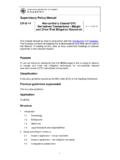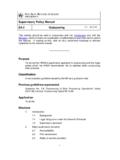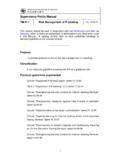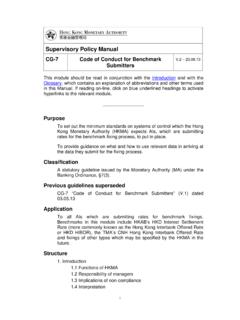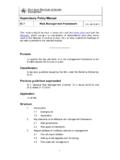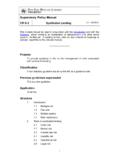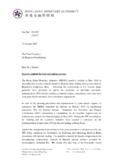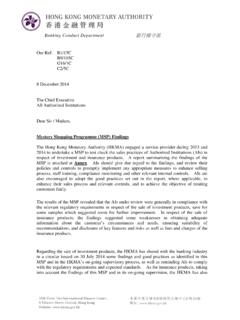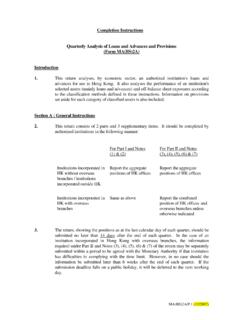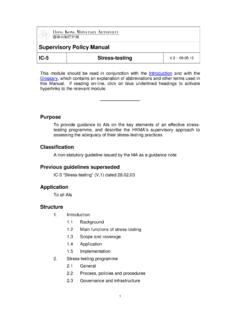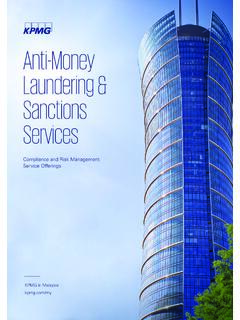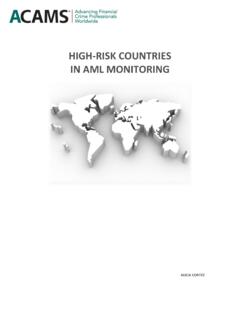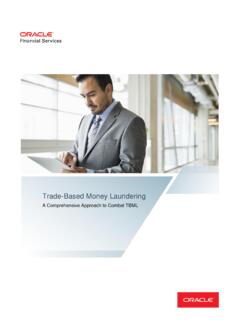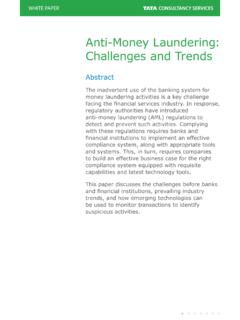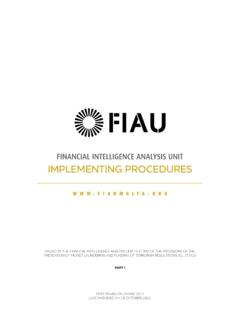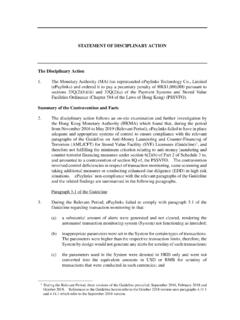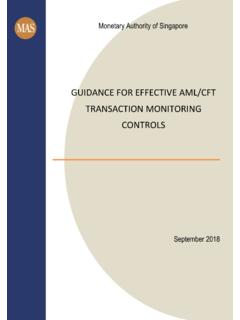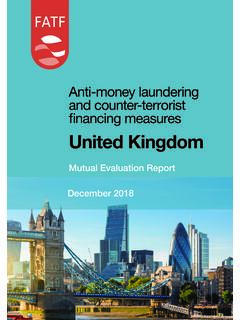Transcription of Transaction Screening, Transaction Monitoring and ...
1 GUIDANCE PAPER Transaction screening , Transaction Monitoring and suspicious Transaction Reporting Revised May 2018 1 Guidance Paper on Transaction Monitoring , Transaction screening and suspicious Transaction Reporting Revised May 2018 1 Executive Summary The Hong Kong Monetary Authority ( HKMA ) places a high value on maintaining the integrity of the Hong Kong banking sector through strong and effective anti-money laundering and counter-terrorist financing policies, procedures and controls ( AML/CFT systems ).
2 Effective AML/CFT systems will assist authorized institutions ( AIs ) to prevent their services from being abused for illicit purposes, including money laundering and terrorist financing ( ML/TF ) and detect it when it does in fact occur. The HKMA conducted thematic on-site examinations on nine AIs in 2012 and 2013 to assess their AML/CFT systems over Transaction screening , Transaction Monitoring and suspicious Transaction reporting. Based on the sound industry practices and certain control weaknesses identified during these examinations, the HKMA has developed this paper1 to set out additional guidance regarding Transaction screening , Transaction Monitoring and suspicious Transaction reporting.
3 In brief, AIs should demonstrate that they have taken all reasonable measures to mitigate ML/TF risks, including: (a) Transaction Monitoring systems, using a level of automation that is appropriate to the scale of the AI s operations, should be validated as effective in identifying unusual or suspicious activity; (b) appropriate emphasis should be placed on the management of Transaction Monitoring alerts, the decision making process for suspicious Transaction reports ( STRs ) and the completion and timely submission of those reports to the Joint Financial Intelligence Unit ( JFIU ); and (c) post-reporting actions should adequately mitigate further ML/TF risks to the AI.
4 1 This guidance paper supersedes the Guidance Paper Good Practices on Transaction Monitoring issued by the HKMA on 4 July 2008. 2 Guidance Paper on Transaction Monitoring , Transaction screening and suspicious Transaction Reporting Revised May 2018 This guidance paper will assist AIs in not only meeting the legal and regulatory obligations under the Anti-Money Laundering and Counter-Terrorist Financing (Financial Institutions) Ordinance ( AMLO ) and the STR reporting ordinances2, but also implementing effective measures to further mitigate their ML/TF risks.
5 Although this paper does not form part of the Guideline on Anti-Money Laundering and Counter-Terrorist Financing (for Authorized Institutions) ( AMLO Guideline ), the HKMA expects every AI to give full consideration to the adoption of the practices this paper describes, where necessary, to improve their AML/CFT systems, taking into consideration their ML/TF risks. The contents of this guidance paper are neither intended to, nor should be construed as, an exhaustive list of the means of meeting AIs statutory and regulatory requirements, and should be read in conjunction with the existing and applicable laws, guidelines and guidance papers.
6 2 The Drug Trafficking (Recovery of Proceeds) Ordinance, Cap. 405, the Organized and Serious Crime Ordinance, Cap. 455, and the United Nations (Anti-Terrorism Measures) Ordinance, Cap. 575 3 Guidance Paper on Transaction Monitoring , Transaction screening and suspicious Transaction Reporting Revised May 2018 2 Transaction screening Designated Parties and Sanctions Matching Algorithms and screening of Non-Latin Script Names and Codes AIs should be conversant with the abilities of the algorithm used in its Transaction screening system, with particular attention being paid to the ability of the name screening system to identify names with minor alterations such as reverse order.
7 Partial name and abbreviated forms. Effective screening procedures3 should be in place for names that use non-Latin script (including Chinese characters) or commercial codes. Such procedures should be reviewed periodically. Designated Parties Database and Sanctioned Jurisdictions List4 AIs should ensure that the designated parties database and sanctioned jurisdictions list maintained are updated in a timely manner in accordance with paragraph of the AMLO Guideline. Relevant departments ( compliance or information technology department) should be assigned to update and review (or oversee the update and review of) the designated parties database and sanctioned jurisdictions list regularly.
8 These practices should exist in policies and procedures. Failure to maintain complete lists for this purpose will result in transactions involving these jurisdictions not being subject to increased scrutiny and enhanced due diligence. AIs internal sanctions policies and procedures should not only implement sanctions as regards designated persons and entities but also may apply to specific types of activities ( supplies of arms). 3 Automated, or other effective manual processes 4 transactions connected to jurisdictions subject to sanction regulations imposed by the Hong Kong Government under the United Nations Sanctions Ordinance, Cap.
9 537, should be subject to appropriate measures to ensure no violation of the relevant sanction requirements. 4 Guidance Paper on Transaction Monitoring , Transaction screening and suspicious Transaction Reporting Revised May 2018 In line with paragraph of the AMLO Guideline, AIs should be aware of the scope and focus of relevant financial/trade sanctions regimes in other jurisdictions that might affect their operations and vigilantly assess the possible impact, ensuring that procedures and processes are in place to mitigate the risks where appropriate.
10 Where an AI subscribes to a commercial risk register (where designated entities and jurisdictions that have been added by the relevant authorities, United Nations Security Council and Office of Foreign Assets Control, would be added automatically to the AIs database), AIs should periodically conduct sample testing on the names of newly added designated entities and jurisdictions to ensure the completeness and accuracy of the database. Irrespective of the action taken by head office or other group entities to update the designated parties database, AIs have ultimate responsibility with respect to the accuracy and completeness of the database and should ensure that systems are in place to support local activities to reflect this principle.
